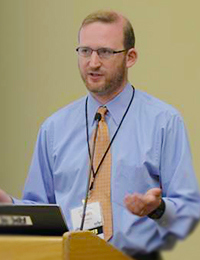Accelerating His Career

Stuart Samberg
Transportation Engineer, RK&K
Transportation engineer Stuart Samberg was looking for some formal training on sustainability issues when he discovered the UW Certificate in Sustainable Transportation: Planning & Livable Communities. He found the classes and curriculum so valuable that he went on to earn his master’s degree. “I just got hooked by the topics,” he said.
Stuart noted that the educational experience and the degree have set him apart in his field.
“The title of Master of Sustainable Transportation in the civil engineering field is still a new concept for a lot of people,” he said. “I think it has raised the profile of what I can bring to the table compared to somebody who doesn't have that same kind of background. It's an extra benefit to have that knowledge.”
In this interview, Stuart talks about how the insights he gained from the master's program have enabled him to bring new solutions to his workplace.
Can you describe your current career role?
I work as a project manager at RK&K in Virginia. I do traffic engineering work – a lot of transportation network analyses and operational planning studies. Basically identifying some sort of network deficiency, whether it be congestion, lack of transit or whatever, and then developing alternatives to address the need.
Are you using what you learned in the degree program in your job today?
Absolutely. There are a number of things I do today that build off topics that we studied or learning how to solve certain problems. I've had clients ask me, "How would you look at this from a perspective of a triple bottom line?" or "How would you do a sustainability review of this?"
Or they ask for a certain type of analysis that most people may not have a ton of exposure to. Few people have had any academic exposure to it, and I honestly would not have been able to provide some of those services without having taken the master's program.
What was the program’s online learning experience like for you?
I really enjoyed the online, interactive format. Everybody had a microphone and we talked through the computer. You were able to hold conversations. It was kind of like being in a classroom and enjoying collaboration with people, but doing so in a way that I could be in my pajamas sitting on my couch.
Did any classes stand out as especially interesting?
In a class on energy, the professor was very into teaching the topic through projects. That was particularly useful to me, because there were a lot of groundbreaking methodologies coming out and it was fun to learn on the fly through these projects.
For example, getting to design a preliminary layout of a wind farm to generate certain amounts of power. That was a hot topic, and it was fun to get a chance to do that from an academic perspective while it was happening in real life somewhere else.
Were you able to work on group projects?
Throughout the program we did a couple of collaborative projects. That was kind of different, because you can't meet in person, but we found a way to really make it work. On one of the collaborative projects that I worked on, the paper that we did ended up getting published. So we obviously did something right!
Can you give us some details about your capstone project?
I did mine on development of a sustainable transportation plan for the City of San Diego. What was enjoyable about that was getting to take nine classes where we learned different topics, roll them all together into one paper and see how you would implement those things in the real world. That was a lot of fun for me, even though it was a lot of hard work. I’ve since submitted it for publication.